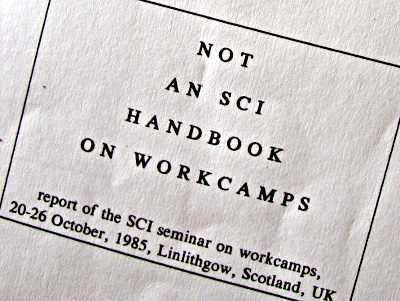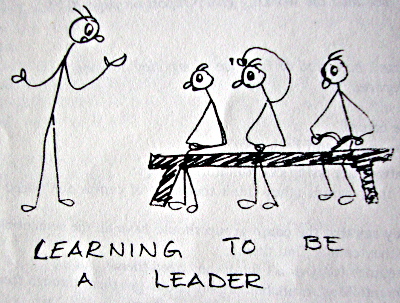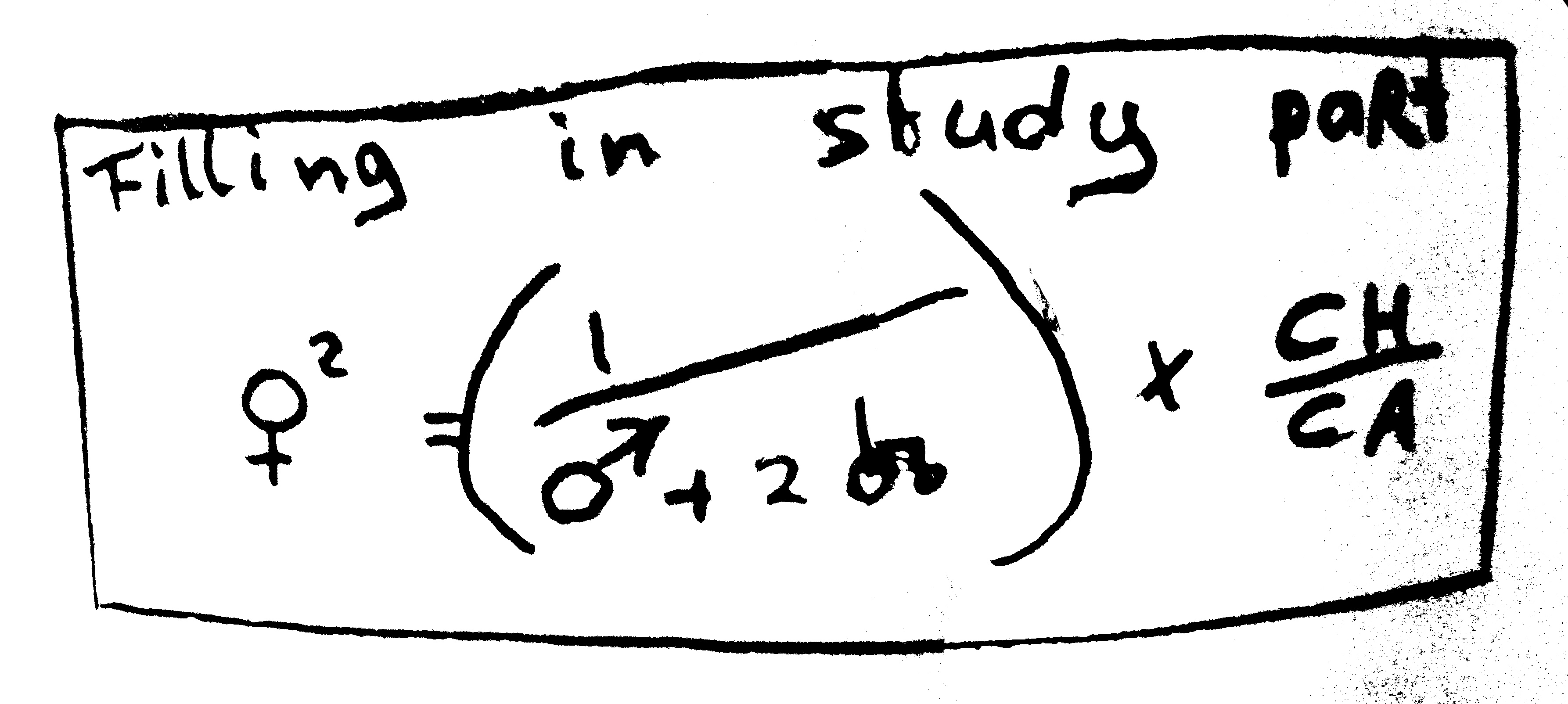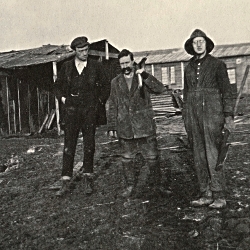Service Civil International
Not an SCI Handbook on Workcamps, Seminar report, 1985
by Heinz Gabathuler (Jul 25, 2017)
 This is somehow typically 1980s: A lot of critical reflection mixed with funny cartoons, a sloppy layout compared to 21st century standards, and above all a very grassroots approach behind it. The readers are warned as early as in the preface on page 2 that this report is quite boring, as it was mainly written for the participants of the SCI seminar on workcamps that took place for a whole week in October 1985 in Linlithgow, Scotland. Copies were distributed to all branches for filing purposes, in order to fulfill our minimal bureaucratic duties. Even though I assume that most of us who are reading this will find it pretty funny and relaxed, it is hardly imaginable that one of the perfectly professionally layouted, carefully edited, and heavily subsidised brochures international SCI bodies are issuing nowadays would even dare to use such language. (And thanks God, even the generation before us took their bureaucratic duties seriously enough to leave one copy for the International Archives!)
This is somehow typically 1980s: A lot of critical reflection mixed with funny cartoons, a sloppy layout compared to 21st century standards, and above all a very grassroots approach behind it. The readers are warned as early as in the preface on page 2 that this report is quite boring, as it was mainly written for the participants of the SCI seminar on workcamps that took place for a whole week in October 1985 in Linlithgow, Scotland. Copies were distributed to all branches for filing purposes, in order to fulfill our minimal bureaucratic duties. Even though I assume that most of us who are reading this will find it pretty funny and relaxed, it is hardly imaginable that one of the perfectly professionally layouted, carefully edited, and heavily subsidised brochures international SCI bodies are issuing nowadays would even dare to use such language. (And thanks God, even the generation before us took their bureaucratic duties seriously enough to leave one copy for the International Archives!)
 Among the 25 exclusively European participants of the seminar were later-to-become SCI celebrities like Tom Ryder (Ireland), Robin Mackie (Scotland) and Johan van Oyen (Netherlands), but most of the names on the participants’ list are unknown to me who in exactly the same year had participated in my first workcamp. Some of the reflections appear surprisingly familiar, though: Are workcamps effective enough in achieving SCI aims? (p. 8); most branches are running some sort of training. The difficulty lays in getting the volunteers to come to these training sessions (p. 21). The report describes what the seminar participants had been doing during the week: A role play with SCI branch executives and potential workcamp hosts or sponsors. Group discussion on the question are some workcamps more important than others? One session was spent on discussing Study Camps and other special types of workcamps, such as women’s camps, fundraising workcamps, peace camps. Another session was about how to present SCI in workcamps. The last day of the seminar was devoted to evaluation of workcamps, with all relevant stakeholders – volunteers, camp sponsor, evaluation at branch and at international level.
Among the 25 exclusively European participants of the seminar were later-to-become SCI celebrities like Tom Ryder (Ireland), Robin Mackie (Scotland) and Johan van Oyen (Netherlands), but most of the names on the participants’ list are unknown to me who in exactly the same year had participated in my first workcamp. Some of the reflections appear surprisingly familiar, though: Are workcamps effective enough in achieving SCI aims? (p. 8); most branches are running some sort of training. The difficulty lays in getting the volunteers to come to these training sessions (p. 21). The report describes what the seminar participants had been doing during the week: A role play with SCI branch executives and potential workcamp hosts or sponsors. Group discussion on the question are some workcamps more important than others? One session was spent on discussing Study Camps and other special types of workcamps, such as women’s camps, fundraising workcamps, peace camps. Another session was about how to present SCI in workcamps. The last day of the seminar was devoted to evaluation of workcamps, with all relevant stakeholders – volunteers, camp sponsor, evaluation at branch and at international level.
 Even though the reports’ claim not to be a handbook is clearly true, the report is far from being boring. It is fun to read because some of the discussions sound familiar, and also because one can imagine that the seminar participants must have had quite a lot of fun: Under the title touristical aspects of workcamps we find the laconic confession that the seminar participants themselves had gone touristic for a few hours: To make an in-depth analysis of two particular case studies, the group split up into two small groups. One went on a guided tour around Edinburgh, the other went for a walk in the surroundings of Linlithgow. No working group reports submitted. (p. 15) Self-irony climaxes on page 29: Problems on workcamps won’t disappear for a long time to come. This was proved by a 2085 workcamp on Jupiter, where the sponsor complained about volunteers not digging enough black hole. There were also problems with a volunteer from Pluto who didn’t really understand what it was all about. Myriam Keustermans from the European Secretariat was awarded for setting up a women’s knitting group, Volker from Germany for the most unhealthy breakfast, and Simon from near Newcastle for arriving late, leaving early and still being around.
Even though the reports’ claim not to be a handbook is clearly true, the report is far from being boring. It is fun to read because some of the discussions sound familiar, and also because one can imagine that the seminar participants must have had quite a lot of fun: Under the title touristical aspects of workcamps we find the laconic confession that the seminar participants themselves had gone touristic for a few hours: To make an in-depth analysis of two particular case studies, the group split up into two small groups. One went on a guided tour around Edinburgh, the other went for a walk in the surroundings of Linlithgow. No working group reports submitted. (p. 15) Self-irony climaxes on page 29: Problems on workcamps won’t disappear for a long time to come. This was proved by a 2085 workcamp on Jupiter, where the sponsor complained about volunteers not digging enough black hole. There were also problems with a volunteer from Pluto who didn’t really understand what it was all about. Myriam Keustermans from the European Secretariat was awarded for setting up a women’s knitting group, Volker from Germany for the most unhealthy breakfast, and Simon from near Newcastle for arriving late, leaving early and still being around.
I really wish I could have been there!
Heinz Gabathuler, International Archives Coordinator
Reference:
In the International Archives, the report may be found in file 40712.2 (Seminars: Reports, Correspondence. 1983 - 1995)



